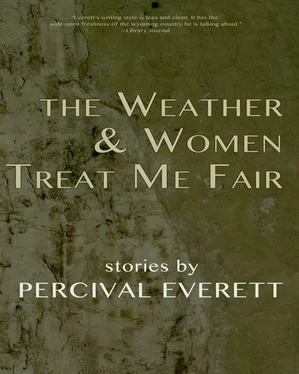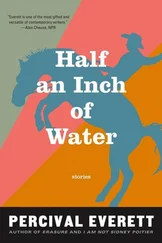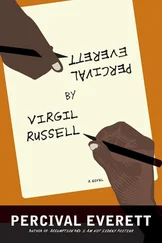Percival Everett - The Weather and Women Treat Me Fair
Здесь есть возможность читать онлайн «Percival Everett - The Weather and Women Treat Me Fair» весь текст электронной книги совершенно бесплатно (целиком полную версию без сокращений). В некоторых случаях можно слушать аудио, скачать через торрент в формате fb2 и присутствует краткое содержание. Год выпуска: 2014, Издательство: Dzanc Books, Жанр: Современная проза, на английском языке. Описание произведения, (предисловие) а так же отзывы посетителей доступны на портале библиотеки ЛибКат.
- Название:The Weather and Women Treat Me Fair
- Автор:
- Издательство:Dzanc Books
- Жанр:
- Год:2014
- ISBN:нет данных
- Рейтинг книги:5 / 5. Голосов: 1
-
Избранное:Добавить в избранное
- Отзывы:
-
Ваша оценка:
- 100
- 1
- 2
- 3
- 4
- 5
The Weather and Women Treat Me Fair: краткое содержание, описание и аннотация
Предлагаем к чтению аннотацию, описание, краткое содержание или предисловие (зависит от того, что написал сам автор книги «The Weather and Women Treat Me Fair»). Если вы не нашли необходимую информацию о книге — напишите в комментариях, мы постараемся отыскать её.
The Weather and Women Treat Me Fair — читать онлайн бесплатно полную книгу (весь текст) целиком
Ниже представлен текст книги, разбитый по страницам. Система сохранения места последней прочитанной страницы, позволяет с удобством читать онлайн бесплатно книгу «The Weather and Women Treat Me Fair», без необходимости каждый раз заново искать на чём Вы остановились. Поставьте закладку, и сможете в любой момент перейти на страницу, на которой закончили чтение.
Интервал:
Закладка:
Percival Everett
The Weather and Women Treat Me Fair
For Al Bearce and Zack Hemenway
A Real Hard Rain
The rain could have fallen harder, in larger drops, been more persistent, or insistent, but that would have made it something else, not rain at all; as it was, it was balancing on the far edge of its definition. When the storm was but five minutes old it promised flooding. The black sky suggested no relief; there was no crack to be found in the swollen mass, not a boundary to be seen. Ten minutes passed and the gutters were useless, the drains couldn’t suck down the flow and the water stood or rushed over curbs toward homes. I was there, I was watching, such a storm the likes of which I had never seen. Cars stalled and why shouldn’t they have, the water by now waist-high in spots. Our house was atop a high hill. People had laughed at me for years when the coming of snow forced me to abandon my car at the base of the steep slope. But now they were not laughing. They were swimming, wading, bailing, paddling, assessing, and regrouping. And the rain did not slacken. When I purchased this house, my wife complained about the hill, the rather severe decline of the back yard — several times our children had lost footing and rolled down into the briars — but this day she was silent. No, she did not complain; she was dry. Besides, the children always healed. In fact, we’d raised veritable mountain goats. On many occasions I would insist to visitors observing our youngsters at play that examinations beyond their shoes would reveal hooves. My wife would glare at me and offer to show off the kids’ scars. “Disgusting,” I would say, and once as she walked away, I uttered, “There will come a flood.”
The water was something; it rose and rose and covered many houses. Many people floated away, I assumed, to other towns. This was what I told my children. We waved to their friends and their friends waved back. My daughter asked me why their waves seemed so different from ours. I told her that if situations were reversed our waves would appear just as theirs — or more so. We learned that squirrels could swim, at least many could — now, at least in our part of the world, all could. The storm was extensive, covering at least the state, probably much more. All radio and television reception failed.
Then the rain stopped and everything was more still than when nothing moves. The clouds broke up and a bright sky shone. There were many birds on our roof and in our trees. We were an island in a vast lake or perhaps a minor ocean. At any rate, we were alone in this malignant, newborn body of water. The houses and trees of the town were lost to view. There were no people. I had not known before, but our house was set on the highest point for many miles in any direction. We were by ourselves and I felt bad for having bought up the adjacent lots. Peering at the sky through the windows, my children wanted to run out to play. I told them it was too deep out, that a slip and roll into the briars would mean a great deal more. My wife did not speak. I had become something of a deity in her eyes, temporary as the office was.
“So, what are we going to do?” she asked finally.
I gazed out the window and observed the sea. “First of all, let us be thankful that we are alive.” I let this soak in for the prescribed time, then turned to their blank faces. “We can’t just sit here.”
“We’ll starve if we do,” said my daughter.
I smiled and passed over her remark. “We have to see what’s left of the world.” Something higher, more noble.
For years I had been just the father, he who stared at clean paper in the typewriter and somehow managed food to the table, he who mumbled and forgot things and where he was going, once washed the same car twice in a day. But now, I was he who had insisted on buying the house on the hill, , the home with the deadly backyard, the inaccessible winter retreat, the last dry spot.
“Dad, are we going to die?” my son asked.
I smiled at him, then turned my eyes to his mother. I studied her for a long second, watching the anxiety swell within her. “No,” I said. I thought she might fly around the room like a released balloon, such was her sigh of relief. I loved it, the power, and I knew I’d best love it good and fast and remember it, for soon reason would return. Reason, the spoiler, the party pooper. Ha! I laughed at reason. It was reason which nearly had us in a split-level down there. I would remind my wife of this when she believed her thinking to be clear.
“Surely we’ll starve,” said my daughter. Food on the brain, that child. An eater from day one, a nipple hog — two at once if she could have managed. And a plump little thing she was. This flood would do her well.
By looking at my son I knew he believed, though I had told him contrary, that we were as good as dead. The little coward, him with his Donald Duck nite-lite and foul-smelling blankey. He was a penny-pincher, too. For someone so sure of the end, he had certainly planned for the future.
Somehow we would set adrift, probably in the raft in the garage if it was still good. My family looked more interesting to me. To my thinking, there is nothing which makes people fascinating like their being about to be drowned. They followed me outside toward the garage, but stopped at the sight of the eternal pool surrounding us. I, too, was taken with it Through the windows, it had seemed less real, as if just a show, but here it went on forever, forever wet, forever deep. We could see nothing but light playing off the surface.
I pulled the raft down from the high shelf above the tools and work counter. Clouds of dust were kicked up and, for the first time ever, the dry, floating particles did not bother me. I didn’t even fan them from my face. None of us did.
My wife went and stood at the open garage door, a child on either side, all facing and staring at how the driveway fell so steeply into the water. I inflated the raft with the bicycle pump.
“What do you think?” I asked, pumping steadily.
“Think? Who can think?” She did not look back.
“We’ll need provisions,” I said. “Even if we don’t venture far away, we’ll need food sooner or later.” I paused to catch my breath, observed the now larger plane of rubber. “We’ll have to rely on our memory of the layout of the town.”
They were not listening. The disaster was creating some distance between us. The situation had moved me lifted my spirits by charging my curiosity and sense of adventure. For my family, it was another story. I wanted to express to them that since we were doomed, we’d best enjoy it But the right words would not avail themselves. I finished the raft and stood away, slapping the luscious dust from my hands. My family turned to view me. Their eyes said, “We’ll wait here.” I tried to appear disappointed, dipping my head and stepping into the house, but I was not. I looked forward to drifting peaceably, alone. Better that I checked the worthiness of the boat alone anyway.
First things first, a nap was in order Actually, I just lay on the sofa and imagined the grid of our town. The market was straight down three blocks, at the bottom of the hill. The water there had to be many tens of feet deep. What I needed was an aqualung, but I had none. For additional food, we would have to try fishing. Worms would be plentiful in the back yard. I sat up and studied the faces which studied mine.
“Pack up food and dry clothing,” I said. “We can’t stay here. We’ve got to see what’s out there.”
“Water is out there,” said my daughter.
“Beyond that,” I said. “Start packing.” I watched as they slowly wandered away to collect items.
Читать дальшеИнтервал:
Закладка:
Похожие книги на «The Weather and Women Treat Me Fair»
Представляем Вашему вниманию похожие книги на «The Weather and Women Treat Me Fair» списком для выбора. Мы отобрали схожую по названию и смыслу литературу в надежде предоставить читателям больше вариантов отыскать новые, интересные, ещё непрочитанные произведения.
Обсуждение, отзывы о книге «The Weather and Women Treat Me Fair» и просто собственные мнения читателей. Оставьте ваши комментарии, напишите, что Вы думаете о произведении, его смысле или главных героях. Укажите что конкретно понравилось, а что нет, и почему Вы так считаете.












